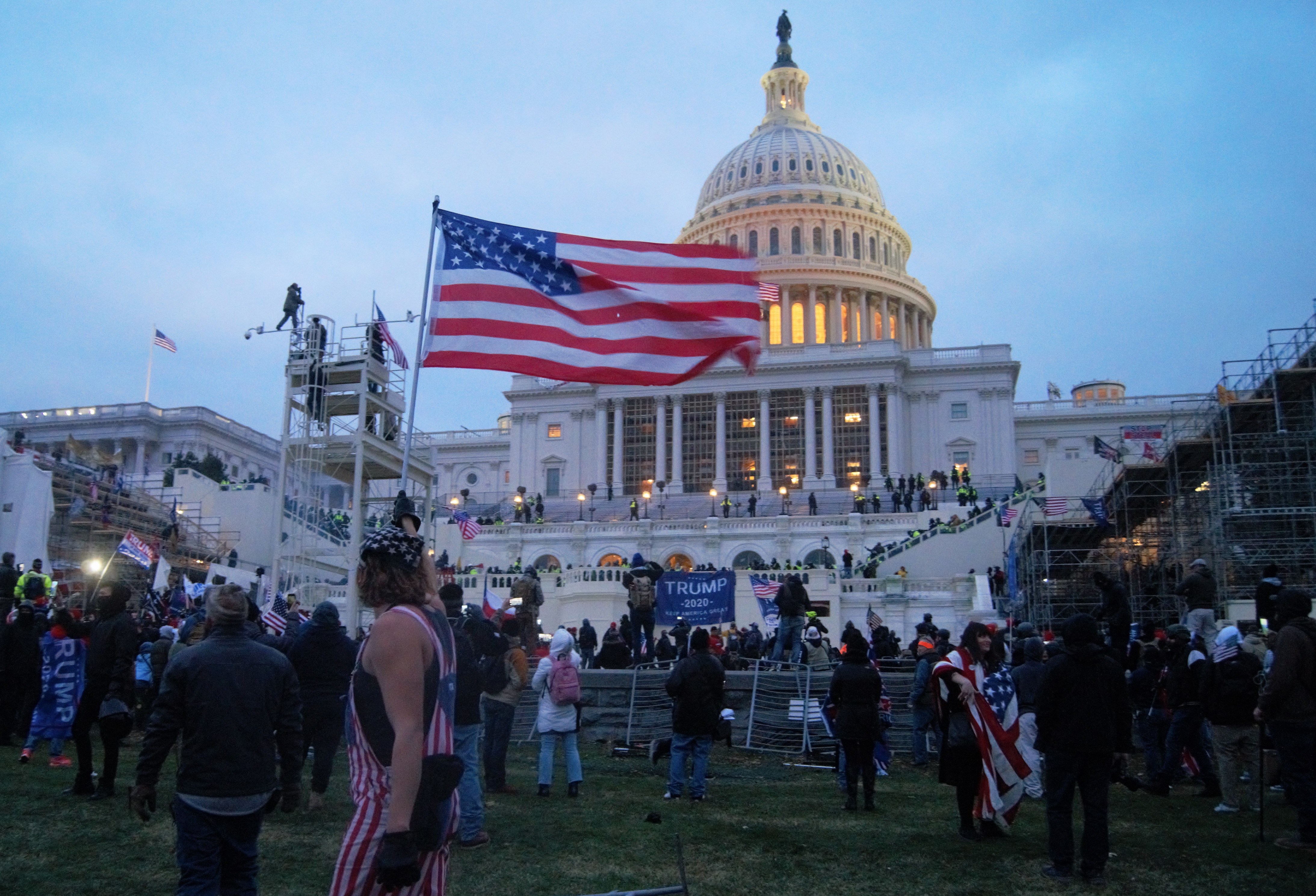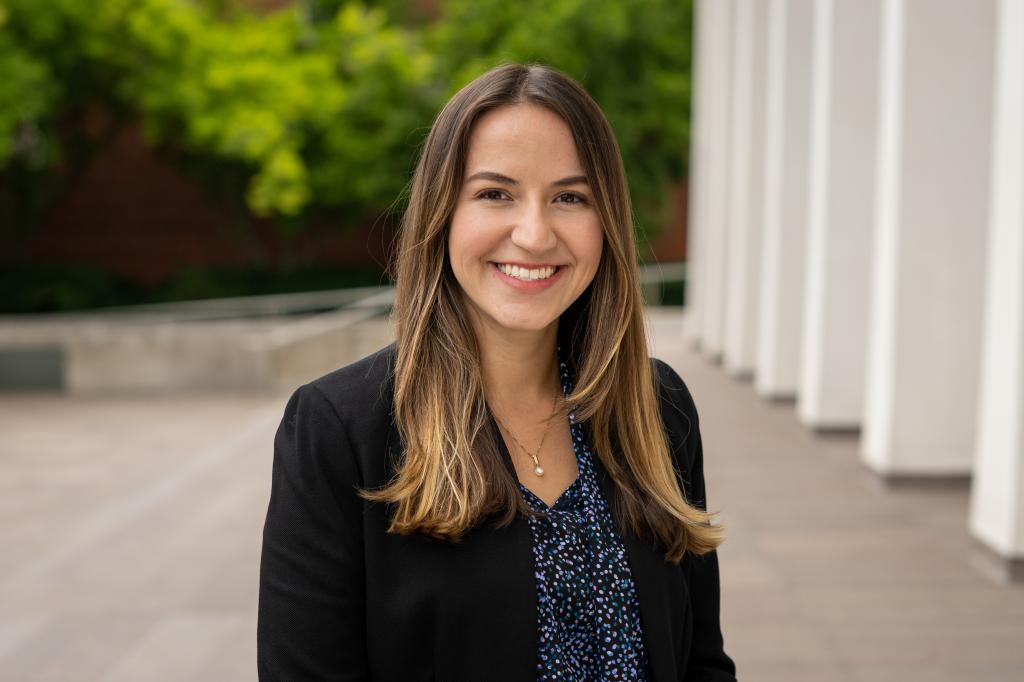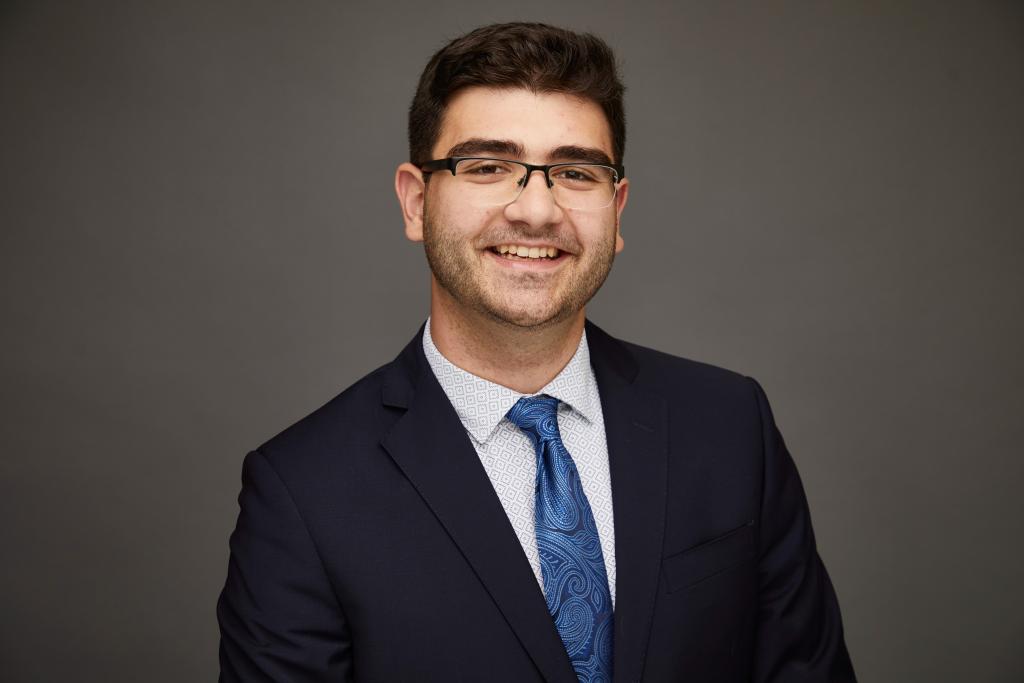Oral Argument Preview: Blassingame v. Trump
Before Wednesday’s oral arguments in Blassingame v. Trump debate the scope of presidential immunity, here’s a preview of the case as well as the arguments from each side.

Tomorrow morning, Dec. 7, the U.S. Court of Appeals for the District of Columbia Circuit will hear oral arguments on whether former President Donald Trump should receive official acts immunity for his conduct surrounding the Jan. 6, 2021, “Save America” rally and march on the U.S. Capitol. Trump appealed the D.C. district court’s February ruling that his actions did not qualify for immunity. The case will be significant in clarifying the “outer perimeter” of presidential functions, within which a president is immune from civil damages liability. Members of the legal academy, think tank experts, and former government officials have weighed in as amici on the case’s implications for the separation of powers, domestic extremism, and the United States’ ability to promote democratic governance and the rule of law overseas. In this article, we explain the background and context of the case as well as the arguments made by the former president, plaintiffs, and several friends of the court.
Factual and Procedural Background
The district court consolidated three cases asking who is civilly liable for the events that transpired on Jan. 6. Capitol Police officers James Blassingame and Sidney Hemby, as well as 11 members of the U.S. House of Representatives in their personal capacities, filed suit against defendants including Donald Trump; Donald J. Trump Jr.; U.S. Rep. Mo Brooks (R-Ala.); and several organized militia groups, including the Oath Keepers, Proud Boys, and Warboys.
The plaintiffs charged that defendants violated 42 U.S.C. § 1985(1), part of the Ku Klux Klan Act of 1871 that protects federal officials from conspiratorial acts intended to prevent them from performing their duties. Plaintiffs assert that, before and during the events on Jan. 6, defendants violated § 1985(1) by fomenting violence, conspiring to prevent members of Congress from fulfilling their duties to certify Electoral College votes, and preventing then-President-elect Joe Biden and then-Vice President-elect Kamala Harris from accepting or holding office. Plaintiffs specifically identify Trump’s Jan. 6 rally speech as spurring his supporters to commit acts of violence against them. Plaintiffs seek damages for emotional and physical injuries resulting from Trump’s and the other defendants’ actions on Jan. 6.
D.C. district court Judge Amit Mehta denied Trump’s motion to dismiss the § 1985(1) claim, holding that Trump’s alleged activities did not qualify for absolute immunity from suit. Categorizing Trump’s disputed activities by pre-Jan. 6 tweets, his Jan. 6 rally speech, and his failure to act once rioters breached the Capitol, Mehta rejected Trump’s arguments that his activities constituted protected presidential functions. The district court also notably held that the First Amendment did not protect Trump’s rally speech, which has prompted questions about ambiguously inciting speech, a topic Alan Rozenshtein and Jed Shugerman have explored previously on Lawfare. The defendants did not appeal this aspect of the decision. Mehta dismissed other claims that are also not at issue on appeal, including U.S. Rep. Eric Swalwell’s (D-Calif.) claim that Trump and other defendants violated companion provision § 1986, which creates civil liability for officials who are aware of a conspiracy and fail to attempt to prevent it.
Oral arguments before the the D.C. Circuit will take place at 9:30 a.m. on Dec. 7. Both parties will have 15 minutes to make their arguments. Chief Judge Sri Srinivasan, Circuit Judge Gregory Katsas, and Senior Circuit Judge Judith Rogers will hear the case.
Former President Trump’s Briefs
In his main brief and reply brief, Trump presents four interconnected arguments. First, he argues that because the 2020 election was a matter of public concern, his Jan. 6 statements were official acts that entitle him to immunity from civil damages liability. Second, he contends that, contrary to appellees’ unsuccessful arguments before the district court, his status as a candidate did not undermine his entitlement to immunity. Third, Trump argues that he is entitled to immunity because his statements on and around Jan. 6 were made pursuant to his responsibilities under the Constitution’s Article II, Section 3, Take Care Clause.
Trump’s Speech on Matters of Public Concern Entitled Him to Immunity
Trump begins by arguing that the district court misapplied the Supreme Court case Nixon v. Fitzgerald, which held the president absolutely immune from liability for actions “predicated on his official acts.” In Nixon, the Court ruled that President Richard Nixon was immune from any liability related to the firing of an Air Force employee as part of a “reorganization and reduction in force,” because such personnel decisions fell “well within the outer perimeter of his authority” to supervise the Air Force.
In Trump’s view, Nixon established executive immunity “wherever and whenever a President speaks on a matter of public concern” because such speech is always an official act. Since Nixon was “doing something Presidents ordinarily do,” and presidents also “ordinarily” communicate to the public about elections, Trump’s statements on Jan. 6, he argues, are entitled to the same official status as Nixon’s Air Force reorganization.
Once the district court found that Trump was speaking on a matter of public concern, the former president argues, its analysis should have ended. Nixon did not instruct lower courts to conduct detailed, fact-based inquiry into the nature of a presidential action. Rather, the Court sought to impose a “bright-line rule” to minimize judicial intrusion into the affairs of the executive. This rule, in the speech context, permits only very limited functional analysis. A court may consider whether a president is discussing an issue of public concern, but it should not look to “the politics or policy being advanced or the words being used.”
Trump then distinguishes two other cases that underpin the district court’s reasoning. He argues that Clinton v. Jones, a subsequent Supreme Court case that held that “immunities are grounded in ‘the nature of the function performed, not the identity of the actor who performed it,’” is inapplicable because it involved pre-presidency actions. He also disputes the relevance of Banneker Ventures, LLC v. Graham, a D.C. Circuit case that called for a fact-intensive inquiry into whether conduct was official, as the case concerned a Washington Metropolitan Transit Authority official and not the nation’s commander in chief. Further, the Graham rule is contrary to Trump’s reading of Nixon, which he argues precludes “any intrusive [fact-based] analysis of the President.”
Trump Would Be Immune From Liability Even If He Were Acting as a Candidate
Trump also calls on the D.C. Circuit to affirm the district court’s holding that the campaign-related nature of Trump’s statements does not, alone, render them purely personal or nonofficial. Trump cites the district court’s acknowledgement that, since “[a] first-term President is, in a sense, always a candidate for office,” it’s not possible to reliably distinguish statements made in a president’s capacity as a candidate from statements made in his capacity as the nation’s executive.
Further, Trump contends that he was “obvious[ly]” using his bully pulpit on Jan. 6. He points out that presidents have long used rhetoric to influence public opinion and advance policy priorities, and he cites use of the bully pulpit by Andrew Jackson, Theodore Roosevelt, Woodrow Wilson, and Joe Biden to support his contention that the bully pulpit is “one of the primary functions of the American President.”
Trump then pivots, pointing out that immunity is well recognized as an important safeguard protecting a range of federal officials’ abilities to speak candidly and act freely. He cites cases supporting broad immunity for judges, prosecutors, members of Congress, and executive branch officials. He also invokes the Westfall Act, which grants common-law tort immunity to federal officials carrying out their official duties. In fact, he asserts, his interest in immunity is stronger than that of these other federal officers. Since the president plays a uniquely important constitutional role, if he is “intimidated in his official duties” by the threat of litigation, “it represents a monumental assault on the will of the American people and can even work to nullify representative government.”
Trump’s Jan. 6 Statements Were Official Acts Pursuant to the Take Care Clause
Finally, Trump argues that the district court construed the Constitution’s Take Care Clause too narrowly in holding that he could not have been exercising his responsibilities under the clause on Jan 6. Although Trump stops short of saying he was trying to enforce a specific statute on Jan. 6, he argues that he had a duty to “‘take care’ with respect to all national legislation, which would include the Electoral Count Act.” This is contrary to the district court’s holding that a president’s Take Care Clause responsibility “does not extend to government officials over whom he has no power or control,” a category that includes Congress, which is responsible for complying with the Electoral Count Act. Trump argues that this conclusion is erroneous, as the Constitution’s framers expected the president to need agents to execute his duties; the Take Care Clause does not explicitly limit the president’s duties to those he can “influence via his executive branch agents”; and historical practice supports a broad, discretionary reading of the Take Care Clause.
Plaintiff-Appellees’ Brief
In their consolidated brief, plaintiff-appellees proffer three main arguments for affirming the district court’s ruling. First, the separation of powers and the structure of the presidency—which govern the scope of presidential immunity—preclude granting immunity to Trump. Second, Trump’s claims of presidential power are overbroad and do not entitle him to immunity. Third, important prudential concerns weigh against granting presidential immunity in this case.
The Constitutional Authority that Defines Presidential Immunity’s Scope Forecloses its Application in This Case
Plaintiffs first argue that constitutional text and structure, as well as presidential immunity’s “justifying purposes,” preclude immunity given the facts of the case. Contrary to Trump’s arguments, plaintiffs use Nixon’s and Clinton’s construction of the Constitution to argue that Trump’s conduct on Jan. 6 falls outside the bounds of presidential immunity. Applying Clinton’s clarification of Nixon’s functional test, plaintiffs argue that Trump’s acts exceeded the “outer perimeter” of his presidential functions because the Constitution gives the president neither authority to interfere in the electoral vote counting process nor any other role in certifying an election. Since Trump instead allegedly obstructed Congress’s ability to execute its exclusive and express constitutional duties, plaintiffs contend that granting Trump immunity would violate the Constitution and undermine the president’s accountability to the American public.
Trump’s Claimed Presidential Powers Are Dangerously Overbroad and Do Not Warrant Immunity
Plaintiffs then contest Trump’s claims that speaking on a matter of public concern justifies immunity and that his actions on Jan. 6 were consistent with his duties under the Take Care Clause. Granting immunity on either of these grounds would undermine the separation of powers and allow presidential immunity to sweep far too broadly.
Plaintiffs counter Trump’s “unprecedented” argument that the president is immune when he speaks on any issue of public concern. They argue that Trump’s interpretation of immunity ignores Nixon’s requisite presidential “functions” analysis and endorses the very “identity-based” conception of immunity that both Nixon and Clinton rejected. Adopting Trump’s “speech on matters of public concern” standard enables a slippery slope and would empower presidents to trample constitutional protections because of politics rather than any constitutional authority. Thus, the district court properly evaluated Trump’s actual acts on Jan. 6 rather than the motive or beliefs behind them.
Plaintiffs argue that Trump’s interpretation of the Take Care Clause is so expansive that it extinguishes the separation of powers. Plaintiffs reiterate their argument that Trump’s conduct does not qualify as an exercise of presidential functions because neither the Constitution nor the Electoral Count Act—the only federal law Trump could plausibly claim he was “taking care” to execute—gives the president a role in certifying electoral votes.
Finally, plaintiffs reject Trump’s other claims that he was fulfilling a presidential function because other officials conducting the same activity would have immunity under the Westfall Act. They argue that, while the Westfall Act applies state respondeat superior law when determining whether to grant immunity to eligible officials, Nixon requires courts to determine immunity based on the scope of the president’s official functions rather than the forum state’s employer liability law.
Prudential Concerns Caution Against Granting Trump Presidential Immunity
Plaintiffs conclude their brief by arguing that prudential concerns weigh against presidential immunity. Although the Nixon court identified both ability to hold presidents politically accountable and potential for mushrooming litigation as concerns weighing in favor of granting immunity, plaintiffs contend that the facts of this case (namely, a president’s interference with electoral vote counting after an election he lost) tip the scales in the opposite direction. When a president interferes in electoral vote counting near the end of his term and after he has been voted out of office, the American public has little recourse to hold him accountable. Furthermore, affirming the district court’s decision would not “open the floodgates” to litigation against presidents because Trump’s alleged conduct was niche; the infrequent and time-limited vote counting process and the limited number of individuals with legally cognizable injuries under § 1985 suggest such a suit is unlikely to be widely replicated in the future.
Supplemental Briefs
Several amicus briefs were submitted for the D.C. Circuit’s consideration, some of which raised concerns not discussed in Trump’s or plaintiffs’ briefs. These amici outlined the case’s significance for domestic extremism in the United States, the nation’s standing abroad, and respect for the presidency. Six law professors also called on the D.C. Circuit to reject Trump’s appeal for reasons echoing plaintiffs’.
Institute for Strategic Dialogue expert in political extremism Jared Holt filed one amicus brief arguing that Trump’s activities leading up to and on Jan. 6 fell beyond the “outer perimeter” of his official duties. Drawing on publicly available documents and official testimony, Holt argues that Trump and his personal associates “conspired with violent extremist groups to prevent the certification of the 2020 Election and use physical force to obstruct official proceedings and prevent the peaceful transfer of power.” Further, Trump and his close associates’ nonofficial efforts to prevent election certification, which Holt says ranged from circulating implausible legal arguments and frivolous lawsuits to endorsing violence after the election, resulted in the Jan. 6 attack on the Capitol.
Another brief, submitted by 40 former senior diplomats and foreign policy officials who served in both Republican and Democratic administrations, also asked the D.C. Circuit to affirm the district court’s decision. The former officials contend that prudential concerns compel the D.C. Circuit to deny Trump immunity, in part because Trump’s actions on Jan. 6 “eroded the United States’ ability to effectively promote democratic values abroad.” The former officials, which include retired military flag and general officers and over two dozen ambassadors, caution that the United States’ peers are watching how American institutions—including the courts—respond to Jan. 6. Granting immunity following the attack on the peaceful transfer of power, the former officials argue, would exacerbate damage done to the United States’ international reputation and would weaken its ability to foster democracy and quell authoritarianism overseas.
In addition, 12 former White House and Department of Justice officials filed an amicus brief challenging Trump’s immunity claim. They argue that, while immunity helps ensure that a president can govern effectively and independently, it has a limit. If any president were immune from liability for acts committed in his personal capacity, he would effectively be above the law, which would be contrary to constitutional structure and deeply rooted American values. And, they emphasize, Trump’s argument that he was acting in his official capacity fails. No responsibility under Article II entails disrupting election certification by inciting an armed mob to march on the Capitol, even if part of this incitement involved speaking on issues of public concern.




.jpeg?sfvrsn=c56aabb1_5)

